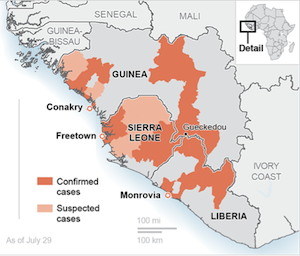FREETOWN, Sierra Leone -- Mabinty Mansaray's plan for Christmas and New Year's was the usual: grab her kids and her two sisters and take the bus from Freetown, the capital of Sierra Leone, to her village more than 100 miles away.
For the 27-year-old hairdresser, the holidays have meant getting together for more than a week to have fun, settle disputes and hold rites to remember the dead.
Not this year.
"Ebola is reported in every district including Freetown," she said. "I don't feel safe to travel with my family in overloaded commercial vehicles as they keep informing us on radio that Ebola spreads through body contact."
Sierra Leone, the hotspot in the Ebola epidemic, is under virtual lockdown. President Ernest Koroma -- a former insurance executive -- canceled most travel between districts and banned Christmas and New Year festivities. Church ceremonies are largely restricted, as is market trading and eating in restaurants.
The beach, a popular gathering spot during holidays in Freetown, is closed.
Christmas, usually marked by Christians and many Muslims with a mass exodus from cities to villages, just isn't in the cards.
Ansumana Gobeh, secretary general of the Motor Drivers and General Transport Workers Union, has noticed the effect at the Clay Factory Central Lorry Park in Freetown, where his office is located.
"Before Ebola, the number of passengers traveling with their families would outnumber the commercial vehicles in the park," Gobeh said. "But it is all different this year, and people have not been coming to the parks as there are so many roadblocks."
Mansaray would have trouble getting home to rural Bafodia, in the far northeast. Commercial vehicles are barred from the Koinadugu District, where her village is located, and private vehicles have to pass through a series of roadblocks to get in.
She's left in the capital, a little idle. "I am staying in Freetown but I get few calls from customers to do their hair because they are afraid of body contact."
Limiting the contact that spreads the disease is the basis of the restrictions announced by Koroma. Sierra Leone surpassed Liberia this month as the country with the highest number of Ebola cases. The outbreak has killed more than 7,500 people in West Africa, most of them in Sierra Leone, Liberia and Guinea.
Among Christian believers, anyone who attended a Christmas Day church service was "requested to return home immediately," Koroma told the nation Dec. 17. New Year's Eve services must be done before 5 p.m., or by radio or television broadcast.
"What we used to have as a New Year watch-night service has been changed to a New Year watch-day service," said Bishop Archibald Cole, president of the Pentecostal Fellowship of Sierra Leone.
Koroma had earlier quarantined five of the country's 14 districts, restricting movements to within each region. Mansaray's home district had already quarantined itself.
"We are indeed having an Ebola Christmas and New Year this time round," Mansaray said.
A Section on 12/26/2014
